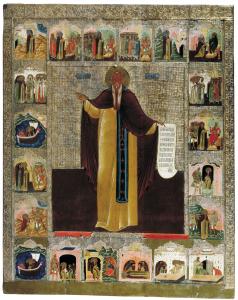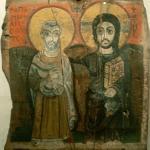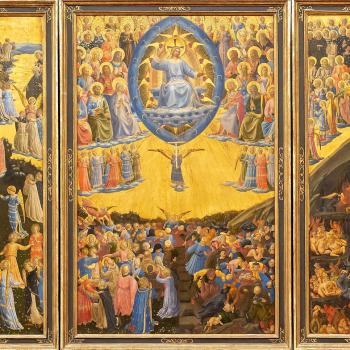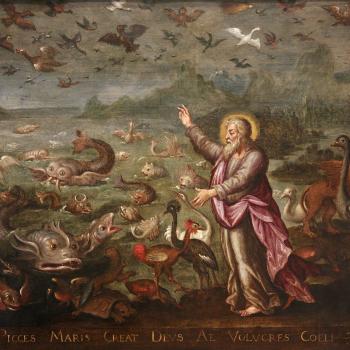
When St. Maximos was taken to trial, one of the accusations made against him was that he was an Origenist, an accusation which he absolutely denied:
When they had been dismissed to their prison, Menas went to the old man and said in the presence of the officials, “God has struck you and brought you here in order for you to receive whatever you did to others, leading everyone into the doctrines of Origen.” To him the servant of God said in the presence of all, “Anathema to Origen and all his doctrines and to all of the same mind!” And the patrician Epiphanios said, “The rumor which you spread about him, abbot Menas, has been dissipated, or else if he was an Origenist, he freed himself from such a crime when he pronounced the Anathema. I will no longer admit that such a thing be said of him.”[1]
Maximos, with the kind of boldness which he used to promote the positions which he accepted, would have had no problem being called an Origenist is if he thought he was one. While there are many possible doctrines one could attribute to Origenism (which is not exactly the same thing as what Origen himself believed), Maximos succulently denied those which, by his time, had been consolidated together as heresies identifiable as Origenism. Among them would have been Origenist theories of apokatastasis. Some could claim that all he denied was the way in which Origenism established such apokatastasis, and certainly, various readers of Maximos seem to suggest this as they consider him to be a universalist. Nonetheless, it also seems that the way they go about asserting his universalism is through a limited reading of his writings, taking elements out of context, and creating a system for the principles they like while ignoring all that Maximos said and wrote on the matter.
Certainly, it is possible for universalists to consider much of what Maximos wrote as useful for their own theological opinions. We all tend to take from what we read and adapt ideas from authors we like to fit our own sensibilities. There is nothing wrong in doing so, indeed, it is how theological development can be had. But if we do so, we must be honest, and recognize the distinction between how we employ our sources from the sources themselves. If we can recognize the difference between Origen and the Origenists who came after him, seeing both the good in those later Origenists but also the developments and deviations their theological writings had from the writings of Origen, we should then be able to recognize how we can take from Maximos and still differ from him from his greater theological perspective.
Maximos, in his writings, wrote against universalism, not because he denied Jesus accomplished some sort of universal objective good for all creation, but because he recognized needed a particular (or individualized) acceptance of that work for it to fully take effect in a given person. That is, Maximos considered the distinction between nature and person significant; when talking about the work of Christ, Maximos talks about the cosmic (natural) significance of Christ’s work, but then, when talking to us, about our own particular salvation, he is clear that we should not presume we will be saved and that if we are not, it has to do with our own particular (and unnatural) mode of willing. Because he left a great number of subtle texts for us to read and learn from, what will be offered here is only a small representation of his thought in regards the questions of personal salvation and perdition.
Maximos looked at Christ’s work as universal, that is, embracing the whole of humanity; like Paul, he could say Christ saved humanity, but for Maximos, the key to understanding this is to understand what Christ did, he did for human nature. The problem for him is not the salvation of humanity, the salvation of human nature, but how particular persons will act in accordance to what Christ has done for humanity: will they turn themselves over to their nature and be saved, or will they cut themselves off from it in a personal, individuated mode of willing? If someone ignores their nature, and so continues to act and will unnaturally, they can do so perpetually if this wish, and in doing so, find themselves among the lost.
Thus, for Maximos, the key to our salvation is for us to find the way to overcome our individualized mode of willing, our gnomic will. We must go from discursive reasoning and deliberation as the mode of willing to that of our nature, allowing our nature to guide and direct us in our actions. This is done through ascesis, as Maximos put forth in his debate with Pyrrhus,[2] and as he pointed out in The Ascetic Life. In The Ascetic Life, he warns his readers of the possibility of perdition, based upon the judgment to come, and says to be saved, we must follow Christ’s commands. The fact that he puts forth a requirement for salvation, and he does so with a grave warning for those who do not follow through with what Christ expects for them,[3] should itself suggest he does not hold out for universal salvation. But he does have the hope that we can be saved:
And why should we perish, brothers? Sinners, let us cleanse our hands; double-minded, let us purify our hearts; let us bewail, let us mourn, let us weep because of our sins. Let us quit our vices; let us trust the mercies of the Lord. Let us fear His threats; let us keep His commandments. Let us love one another with our whole heart.” [4]
But he says we should not presume salvation, that is, we should not presume forgiveness of sins:
Let us not suffer thoughts that belittle our sins, that conjecture that already they have forgiveness. For against these the Lord safeguarded us, saying: Beware of false prophets, who will come to you in sheep’s clothing, but inwardly they are ravening wolves. For so long as our mind is beset by sin, we have not attained forgiveness; for we have not yet produced fruit worthy of penance. Fruit of penance is the soul’s detachment; detachment, the wiping out of sin. [5]
It is possible, of course, to hold to the particular judgment, to suggest that all will have to face the consequences for their unresolved sinful actions, but this will be temporary, making what happens after the judgment to be like purgatory. If this is the case, it would still be beneficial to work out our salvation here and now, so that we have less to purge from us after death, making our entrance into beatitude that much swifter. But, Maximos suggests, those who go to death with a will to themselves, a desire to perpetuate the gnomic mode of wiling against their nature, will find that they will continue to will in such a fashion perpetually, and so they will not find themselves entering the beatitude which God gives them according to their nature:
All these things will come about if the soul, as I have said, uses its own powers properly, and if, consistent with God’s purpose, it passes through the sensible world by way of the spiritual principles that exist within it, so that with understanding it arrives at God. If, however, it makes the wrong or mistaken use of these powers, delving into the world in a manner contrary to what is proper, it is obvious that it will succumb to dishonorable passions, and in the coming life will rightly be cast away from the presence of the divine glory, receiving the dreadful condemnation of being estranged from relation with God for infinite ages, a sentence so distressing that the soul will not be able to contest it, for it will have as a perpetually relentless accuser its own disposition, which created for it a mode of existence that in fact did not exist. [6]
Thus, they create their own disposition, one which is contrary to nature; because they perpetually act unnaturally, they will be estranged from God forever. They have not learned to set aside their individualized, selfish mode of willing. Acting against nature, they struggle against God, who created that nature, and against Christ, who came to save them by his work with human nature. Nonetheless, Christ still has accomplished something for them. For they still possess human nature and so will be resurrected in the general resurrection of the dead. This is what Maximos often talks about when exploring the cosmic work of Christ: how Christ’s resurrection from the dead will lead to a similar restoration to the whole of creation. It is important for us to realize that this does not mean everyone will necessarily be resurrected into beatitude. Those who hold on to their selfishness, who reject what is natural, will find themselves cut off from God. This is why the rich man in the story of Lazarus is eternally punished:
The rich man, on the other hand, who was engrossed in material things, found himself outside of this repose, receiving no benefit from his life in the flesh other than to be eternally punished for it. For whereas his sole desire was to lay hold of the present life, he failed to take possession of it, since by nature it flows only relentlessly and cannot be grasped. Neither was he able to acquire a share in the future life, which he wholly neglected and for which he had not the slightest desire, for by its very nature that life joins itself only to those who love it with their whole being, and who in their desire for it have eagerly and with pleasure endured every manner of pain and discomfort. [7]
Sinners, those who continue to fight against virtue, against the purity of their nature, by their gnomic mode of willing, therefore, cut themselves off from God – making it difficult to describe their “placement” for eternity:
Thus, according to the first interpretation, by way of affirmation, the impious man and the sinner will be found in a place that is by no means free of a life without limits, since he will not enjoy that life which fully escapes limitation and is beyond any location. According to the second interpretation, by way of negation, there is no “where” in which he might appear, since he does not enjoy God as sustaining his life unto well-being. In either case, “how” he will exist when he does not have God as his very own location, the only sure foundation of well-being, which is God? Simply stated, if, only after much vexation, “the righteous man will be saved,” what will happen or what will become of the person who in this present life has no interest in piety or virtue?[8]
They will be resurrected, but they will not experience the glory of eternal life, which is participation in the divine life:
Whoever does not participate in the power of well-being in relation to God will be like a part of the body utterly bereft of the soul’s vital energy. [9]
And so, we read in the scholia for question 61 in his answers to Thalassios (which reflects extremely well his own theology, whether or not it is actually from him):
God, he says, according to a unique, infinitely powerful intention of His goodness, will contain all angels and human beings, both the good ones and the evil ones. Not all of them, however, will participate equally in God, who will indeed enter into all without distinction, but in a manner proportionate to each. On the one hand, those who in all things kept the disposition of their will in equilibrium with nature, making it actually receptive of the principles of nature, in accordance with the whole principle of eternal well-being, shall – owing to the receptivity of their will to the intention of God – participate in the whole of divine goodness, which will shine upon them just as it will upon angels. Those, on the other hand, who in all things did not maintain the disposition of their will in equilibrium with nature, and who in fact scattered the principles of nature in relation to the whole principle of well-being, shall – owing to the antipathy of their will to the intention of God – fall away from the whole of divine goodness, according to the manifest intimacy of their will with ill-being. This will be the reason for the separation between God and individuals such as these, for the disposition of their will lacks the principle of well-being vivified by actual works of virtue, for it is by this principle the divine life is of a nature to shine forth. On the day of judgment, then, the principle of nature will be the balance weighing the will of each one, revealing its movement toward either what is good or evil, for it is according to such movements that participation of lack of participation in divine life is of a nature to be actualized. For God, when He becomes present to all, will contain all according to the principles of being and eternal being, but according to the principle of eternal well-being, He will contain only, and in a special way, holy angels and holy human beings, leaving those who are not such as to these to receive eternal ill-being as the fruit of the disposition of their will. [10]
The disposition of one’s will, the mode of willing, is key to Maximos’s understanding of our eschatological fate. Either we embrace asceticism and overcome the fallen mode of willing, so we can return to the natural goodness of our nature, or, we will embrace ourselves, and continue to cut ourselves off from our very nature, and so exist in an unnatural way in eternity, cut off from beatitude because we cut ourselves off from what God gives to us through our nature. Only those who yield to God, that is, overcome their self and the fallen mode of willing which follows after a self-centered form of engagement, will then experience the eternal bliss of theosis:
In other words, what sort of end or judgment awaits those who have not only kept alive and active – both in soul and in body, both in will and in nature – the birth from Adam based on pleasure, but who embrace neither our God and Father, who appeals to them through His incarnate Son, nor the Mediator and Son Himself, who acts as ambassador for the Father, and who was Himself willingly sent, by the Father’s counsel, to reconcile us to the Father, to die for our sake, so that in himself he might glorify us, illuminate us with His beauty and His own divinity, precisely to the extent that, because of us, He submitted to being dishonored by our sufferings? This, it seems to me, is the “gospel of God,” namely that the incarnate Son is God’s ambassador and advocate for humanity, and has earned reconciliation to the Father for those who yield to Him for the divinization that is without origin. [11]
Nonetheless, Maximos, in where he affirms the universal work of Christ to heal creation, makes it clear this is shown in the way Jesus resurrects the dead:
Having abandoned the logically incoherent notion that souls exist before bodies, he will, together with us, believe the Lord when He says that those who rise in the resurrection will never die again, owing to the definitive manifestation of, and our direct participation, in the ultimate object of desire. [12]
Those who read Maximos, seeing how he talks about Christ’s universal work, are right in saying Maximos promotes this, but Maximos always continues to point out that the particular realization of that universal work is also necessary for beatitude. Without it, our resurrection will not be for our beatitude:
No one who enjoys indulging the flesh will be able to pass over to Him, or who takes greater pleasure in the deceptions of the world than in His blessed glory; neither will such a person be able to stand next to Him who conquered the world, since he himself has been defeated by the world and wrongly rejoices in his defeat. For divine justice has judged that those who reduce human existence to this present life, and who take pride in wealth, bodily health, and various honors, and who believe that these things alone constitute blessedness, reckoning the good things of the soul as having no value, will not be deemed worthy of receiving a share in the divine and eternal good things, to which they gave absolutely no thought, owing to their overwhelming interest in material things, for they were completely ignorant of the extent to which the virtues transcend wealth, health, and other transient goods. [13]
Thus, Maximos affirms, it is how we address Christ in this life which will be manifested in eternity. The ascetic path, the ascetic life, can help us overcome our selfish, gnomic mode of willing, so that we can truly embrace our nature and receive all the deifying grace God desires to share with us in and through it. But we must truly embrace the path; we must realize we will not simply be saved just because we exist, nor even, because we have faith in Christ:
Now perhaps someone will say: I have faith and faith in Him is enough for me for salvation. But James contradicts him, saying: The devils also believe and tremble; and again: Faith without works is dead in itself, as also the works without faith. In what manner then do we believe in Him? Is it that we believe Him about future things, but about transient and present things we do not believe Him, and are therefore immersed in material things and live in the flesh, and battle against the Spirit? But those who truly believed Christ, and, through the commandments, made Him to dwell wholly within themselves spoke in this fashion: And I live, now not I; but Christ liveth in me. And that I live now in the flesh: I live in the faith of the Son of God, who loved me, and delivered Himself for me. For that reason while they were suffering for Him for the salvation of all as exact imitators of Him and as genuine keepers of His commandments, they said: We are reviled, and we bless; we are persecuted, and we suffer it; we are blasphemed, and we entreat.[14]
Maximos does not suggest no one will suffer eternal punishment. In his writings, he suggests otherwise. If we all acted naturally, we would all be saved; but since we do not, since we act gnomically, following the discursive mode of willing which comes out of our self-centered mode of engaging our nature, he believed people could will against their salvation, and they could do so perpetually. Those who are lost, are lost because they perpetually will against salvation for themselves, and not just because of some particular sin in and of itself. What one wills is important, and how one wills, is likewise important. Unless we find the way to change from our particularized, fallen mode of willing, to our natural mode of willing which will allow us to embrace the virtues, Maximos feared we will truly be lost and suffer eternal perdition. Though it is easy to see how and why people, not looking at all his writings, but only those dealing with Christ’s cosmic work, could end up thinking he might be a universalist, the full body of writings suggests otherwise, and his understanding of the will is key to why he believed some could perish.
[1] Anastasius, “The Trial of Maximus” in Maximus Confessor. Selected Writings. Trans. George C Berthold (New York: Paulist Press, 1985), 22. [Anastasius’s authorship is in dispute].
[2] See St. Maximus the Confessor, The Disputation with Pyrrhus. Trans. Joseph P. Farrell (South Canaan, PA: St. Tikhon’s Seminary Press, 1990), 33.
[3] See St. Maximos, “The Ascetic Life” in St. Maximus The Confessor: The Ascetic Life. The Four Centuries on Charity. Trans. Polycarp Sherwood, OSB (New York: Newman Press, 1955), 120.
[4] St. Maximos, “The Ascetic Life,” 131-2.
[5] St. Maximos, “The Ascetic Life,” 134.
[6] St. Maximos the Confessor, The Ambigua. Volume I. trans. Nicholas Constas (Cambridge: Harvard University Press, 2014). 439 [Amb. 21].
[7] St. Maximos the Confessor, The Ambigua. Volume I, 279-81 [Amb. 10].
[8] St. Maximos the Confessor, On Difficulties in Sacred Scripture: The Responses to Thalassios. Trans. Maximos Constas (Washington, DC: CUA Press, 2018), 445[Question 61].
[9] St. Maximos the Confessor, On Difficulties in Sacred Scripture: The Responses to Thalassios, 444 [Question 61].
[10] St. Maximos the Confessor, On Difficulties in Sacred Scripture: The Responses to Thalassios,, 449 [Question 61; Scholia].
[11] St. Maximos the Confessor, On Difficulties in Sacred Scripture: The Responses to Thalassios, 443 [Question 61].
[12] St. Maximos the Confessor, The Ambigua. Volume I, 135 [Amb. 7].
[13] St. Maximos the Confessor, The Ambigua. Volume I, 281-3 [Amb. 10].
[14] St. Maximos, “The Ascetic Life,” 123.
Stay in touch! Like A Little Bit of Nothing on Facebook.
If you liked what you read, please consider sharing it with your friends and family!












